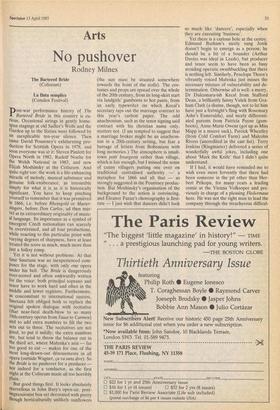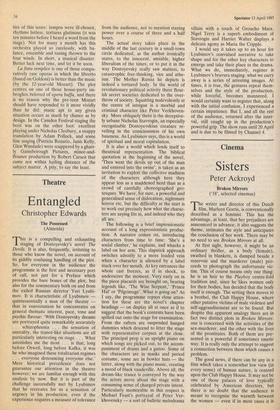Arts
No pushover
Rodney Milnes
pBartered ost-war performance history of The Bride in this country is cu- nous. Occasional airings in gently home- Spun stagings at old Sadler's Wells and the
Garden up to the Sixties were followed by an inexplicable ten-year silence. Then Came David Pountney's exhilarating pro- duction for Scottish Opera in 1978, and soon everyone was at it: Steven Pimlott for Opera North in 1982, Rudolf Noelte for the Welsh National in 1983, and now Elijah Moshinsky at the Coliseum. And quite right too: the work is a life-enhancing miracle of melody, musical substance and genuine folk-exuberance, as irresistible
simply for what it is as it is historically Significant. You have to keep pinching Yourself to remember that it was premiered is 1866, i.e. before Rheingold or Master- singers, before Don Carlos, ad then mar
vel at its extraordinary originality of music- al language. Its importance as a symbol of emergent Czech nationalism can scarcely be overstressed, and all four productions, While reacting to this particular point with varying degrees of sharpness, have at least treated the score as much, much more than Just a folksy romp.
Yet it is not without problems. At that time Smetana was an inexperienced com- Poser for the stage, with only one opera
under his belt. The Bride is dangerously over-scored and often awkwardly written
for the voice: both principal soprano and tenor have to work hard and often in the middle and lower registers. Furthermore, as concomitant to international success, Smetana felt obliged both to replace the original spoken dialogue with recitative (that near-fatal death-blow to so many
19th-century operas from Faust to Carmen) and to add extra numbers to fill the two
acts out to three. The recitatives are not good, to put it mildly; the extra numbers are, but tend to throw the balance out in the third act, where Matenka's aria — far too good to cut — makes for one of the Most long-drawn-out dénouements in all
Opera (outside Wagner, cc: va sans dire). So the Bride is no pushover for a producer — nor indeed for a conductor, as the first
night at the Coliseum made all too horribly Plain.
But good things first. It looks absolutely Marvellous in John Bury's open-air, post- Impressionist box-set decorated with pretty though horticulturally unlikely sunflowers La Bata semplice (Camden Festival) (the sun must be situated somewhere towards the front of the stalls). The cos- tumes and props are spread over the whole of the 20th century, from its long-skirt start via landgirls' gumboots to hot pants, from an early typewriter on which Kecal's secretary taps out the marriage contract to this year's carbon paper. The odd anachronism, such as the tenor signing said contract with his christian name only, matters not. (I am tempted to suggest that a marriage broker might be an anachron- ism in a 20th-century setting, but fear a barrage of letters from Bohemians with long memories.) The atmosphere is small- town petit bourgeois rather than village, which is fair enough, but I missed the sense of canny villagers putting one over on traditional centralised authority — a metaphor for 1866 and all that — so strongly suggested in the Pountney produc- tion. But Moshinsky's organisation of the background to the action is convincing, and Eleanor Fazan's choreography is first- rate — I just wish that dancers didn't look
so much like 'dancers', especially when they are executing 'business'.
Yet there is a curious hole at the centre. Edmund Barham's nicely sung Jenik doesn't begin to emerge as a person; he should be a bit of a bounder (Arthur Davies was ideal in Leeds), but producer and tenor seem to have been so busy avoiding operatic swashbuckling that there is nothing left. Similarly, Penelope Thorn's vibrantly voiced Mafenka just misses the necessary mixture of vulnerability and de- termination. Otherwise all is well: a merry, Dr Dulcamara-ish Kecal from Stafford Dean, a brilliantly funny Va§ek from Gra- ham Clark (a shame, though, not to let him have just a fortnight's fling with Rosemary Ashe's Esmeralda), and nicely differenti- ated parents from Patricia Payne (gum- boots), Anne-Marie Owens (got up as Miss Mapp in a mauve sack), Patrick Wheatley (from Cold Comfort Farm) and Malcolm Rivers (uncredited in the cast list). Terry Jenkins (Ringmaster) delivered a series of wonderfully awful jokes, including one about 'Mark the Knife' that I didn't quite understand.
If! had, it would have reminded me to wish even more fervently that there had been someone in the pit other than Her- bert Prikopa, for many years a leading comic at the Vienna Volksoper and pre- viously in charge of a pleasing Fledermaus here. He was not the right man to lead the company through the treacherous difficul-
ties of this score: tempos were ill-chosen, rhythms listless, textures glutinous (it was ten minutes before I heard a word from the stage). Not for many a month has this orchestra played so carelessly, with ba- lance, ensemble and tuning thrown to the four winds. In short, a musical disaster. Better luck next time, and let it be soon.
La finta semplice is one of those compa- ratively rare operas in which the libretto (based on Goldoni) is better than the music (by the 12-year-old Mozart). The plot centres on one of those house-party im- broglios beloved of opera buffa, and there is no reason why the pre-teen Mozart should have responded to it more vividly than he did: music apt to any given situation occurs as much by chance as by design. In the Camden Festival staging the boot was on the other foot: excellent playing under Nicholas Cleobury, a snappy translation by Adam Pollock, and some fine singing (Patricia Rozario, Janis Kelly, Glen Winslade) were scuppered by a ghast- ly Gainsborough Pictures, mince-and- flounce production by Robert Carsen that came not within hailing distance of the subject matter. A pity, to say the least.















































 Previous page
Previous page